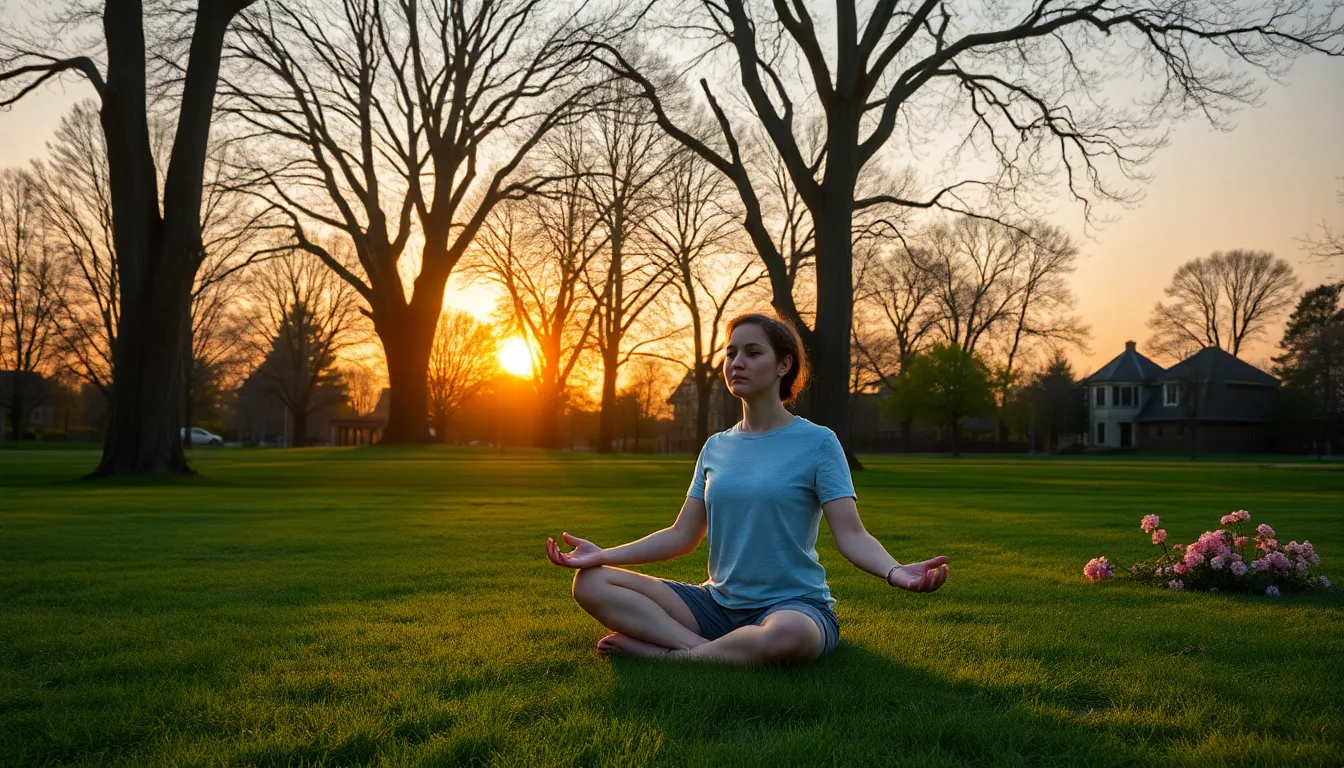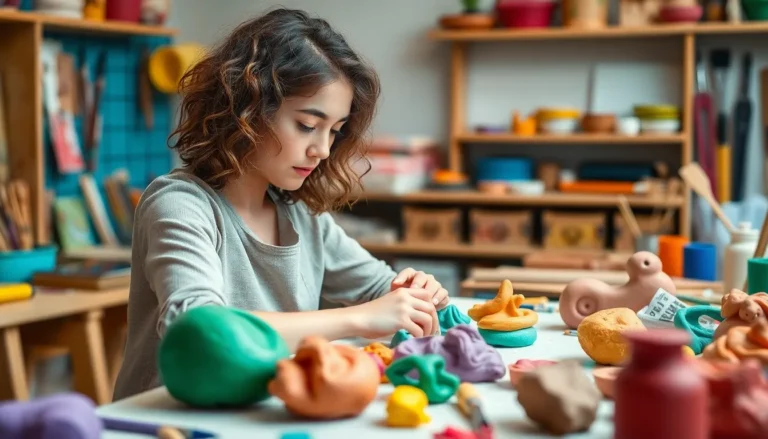Table of Contents
ToggleIn a world buzzing with distractions and endless to-do lists, the concept of present living intention might sound like a fancy yoga retreat mantra. But it’s more than just a trendy phrase; it’s a powerful approach to life that can transform the mundane into the extraordinary. Imagine savoring your morning coffee as if it were the elixir of life itself, instead of just another caffeine fix.
Understanding Present Living Intention
Present living intention fosters a deeper connection with daily experiences, turning ordinary moments into opportunities for mindfulness. This practice emphasizes awareness and presence in each activity, enhancing overall contentment.
Definition and Importance
Present living intention encompasses focusing on the “now” rather than dwelling on past events or future concerns. By doing so, individuals recognize the significance of each moment. This awareness cultivates appreciation for daily activities, like savoring a warm cup of coffee. Developing this mindset encourages emotional well-being and reduces feelings of stress or anxiety, reinforcing the importance of living intentionally.
Key Concepts
Several key concepts underpin present living intention. First, mindfulness plays a crucial role in enhancing awareness and presence. Engaging in meditation or breathwork can facilitate this practice. Second, gratitude emerges as a vital component, helping individuals acknowledge and appreciate their surroundings. Third, authenticity influences the expression of one’s true self, creating genuine connections with others. Practicing these concepts allows individuals to create fulfilling experiences, promoting overall harmony in life.
The Philosophy Behind Present Living Intention

Present living intention emphasizes experiencing life fully in each moment. This philosophy roots itself in mindfulness, fostering a deeper understanding of daily experiences.
Historical Perspective
Historical practices emphasize being present in the moment. Ancient traditions, such as Buddhism, highlighted mindfulness as a core principle. Philosophers like Thich Nhat Hanh articulated the importance of savoring life’s simplicity. They advocated for awareness of one’s surroundings and feelings. Historical texts often referenced rituals that helped individuals connect with the present. Such practices remind people of the importance of living intentionally rather than getting lost in thoughts of the past or future.
Contemporary Views
Contemporary views focus on integrating present living intention into daily life. Modern psychology supports mindfulness as a means to achieve emotional well-being. Therapists recommend techniques like meditation and breathing exercises. Research indicates that being present reduces anxiety and enhances satisfaction. Many contemporary educators incorporate mindfulness into curricula, helping students develop awareness. This approach encourages individuals to appreciate their surroundings and relationships. Embracing present living intention today leads to improved mental health and greater life satisfaction.
Practical Applications of Present Living Intention
Present living intention enriches daily experiences and enhances mental health practices. Applying this concept can transform routine moments into mindful opportunities.
In Daily Life
Present living intention manifests in daily life through intentional practices. Individuals can start by savoring morning rituals, like coffee or tea, where focus remains on taste and aroma. Engaging with nature, whether through walking or gardening, allows people to connect with their surroundings, promoting mindfulness. Emphasizing gratitude for small moments, such as a friendly conversation or a beautiful sunset, fosters appreciation. Practicing active listening during conversations strengthens connections and enhances empathy. Regularly setting aside time for reflection aids in cultivating awareness of emotions and thoughts.
In Mental Health Practices
In mental health practices, present living intention plays a vital role. Therapists frequently incorporate mindfulness techniques into sessions to help clients manage anxiety and stress. Techniques like guided meditation or deep breathing exercises encourage individuals to stay grounded in the present. Cognitive Behavioral Therapy (CBT) often employs mindfulness strategies, enabling clients to alter negative thought patterns. Research consistently shows that practicing mindfulness can enhance emotional resilience and well-being. Journaling about daily experiences and emotions promotes self-reflection, reinforcing a sense of clarity and purpose.
Benefits of Embracing Present Living Intention
Embracing present living intention offers multiple benefits that can transform daily life. Focusing on the present enhances overall well-being, allowing individuals to experience moments fully and cultivate gratitude.
Enhanced Well-being
Well-being improves significantly through present living intention. Daily mindfulness practices foster emotional resilience. Engaging with the present fosters deeper appreciation for simple pleasures, resulting in increased life satisfaction. Research indicates a direct correlation between mindfulness and reduced anxiety levels. Techniques like meditation not only calm the mind but also create space for emotional clarity. Regular practice encourages individuals to feel more connected to themselves and their environments, positively impacting mental health. Overall, integrating these practices enables a pathway to enhanced well-being and greater emotional stability.
Strengthened Relationships
Relationships benefit when individuals embrace present living intention. Active listening becomes a natural part of conversations, promoting deeper connections with others. Engaging fully in interactions fosters trust and openness. Individuals who focus on the present tend to express empathy, enhancing the quality of relationships. Gratitude for others strengthens bonds, leading to more meaningful exchanges. When present, people cultivate awareness of feelings and needs, ensuring that their responses are thoughtful and authentic. This attentiveness nurtures healthier dynamics and fosters stronger interpersonal connections. Embracing present living intention thus serves as a foundation for meaningful relationships.
Challenges to Maintaining Present Living Intention
Maintaining present living intention often involves navigating several challenges. Individuals frequently encounter common obstacles that hinder their ability to remain focused on the present moment.
Common Obstacles
Busy lifestyles contribute significantly to distractions. Many people juggle multiple responsibilities, resulting in divided attention and fragmented experiences. Past regrets or future worries can cloud thoughts, making it hard to immerse oneself in the here and now. Additionally, digital interruptions, such as notifications from smartphones, pull attention away from meaningful moments. Emotional struggles, like anxiety or stress, also interfere with maintaining mindfulness, creating barriers that seem insurmountable.
Strategies for Overcoming Challenges
Effective strategies can help individuals counter these challenges. Practicing mindfulness meditation fosters awareness and sharpens focus. Engaging in daily rituals, such as savoring meals or morning coffee, encourages a connection with the present. Technology can also serve as an ally; setting specific times to check devices reduces distractions. Regular journaling promotes clarity and helps process emotions, enhancing self-awareness. Seeking support from therapists provides tools to navigate emotional difficulties and establish coping mechanisms for a more intentional life.
Embracing present living intention transforms everyday moments into profound experiences. By focusing on the here and now individuals can cultivate a sense of gratitude and mindfulness that enhances emotional well-being. This approach not only reduces stress but also fosters deeper connections with others.
As people navigate the challenges of modern life they can find solace in simple practices that promote awareness and appreciation. Integrating techniques like meditation and journaling into daily routines empowers individuals to live intentionally. Ultimately present living intention serves as a powerful tool for creating a more fulfilling and harmonious life.







